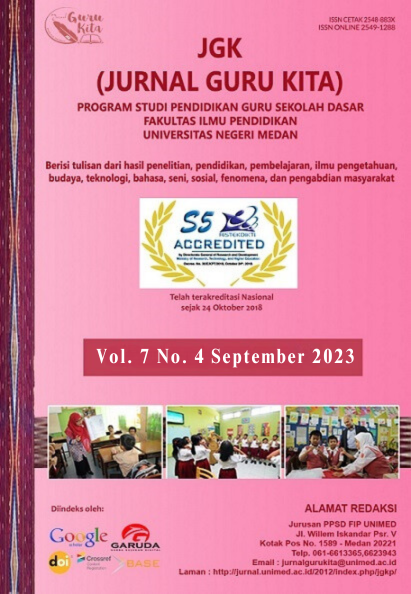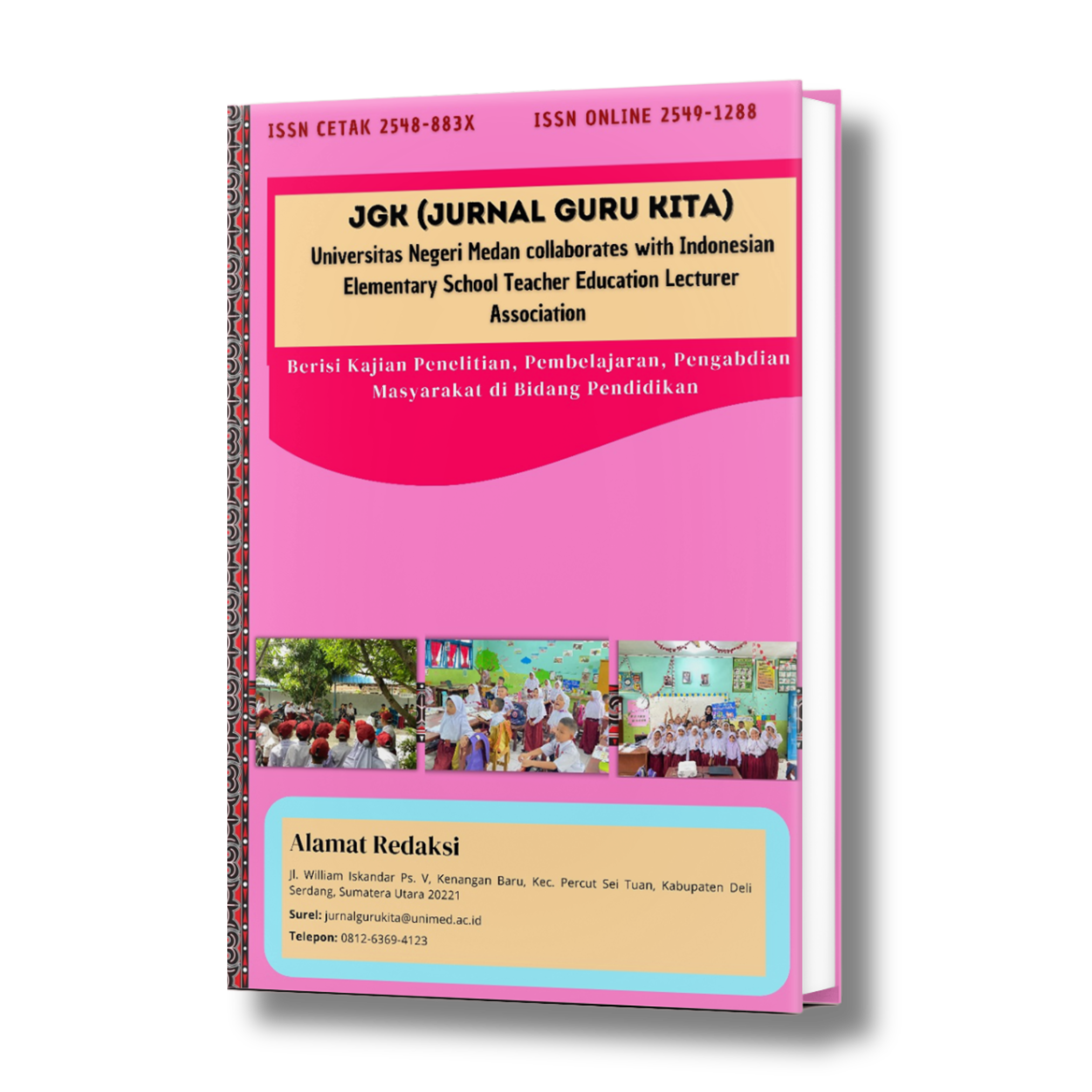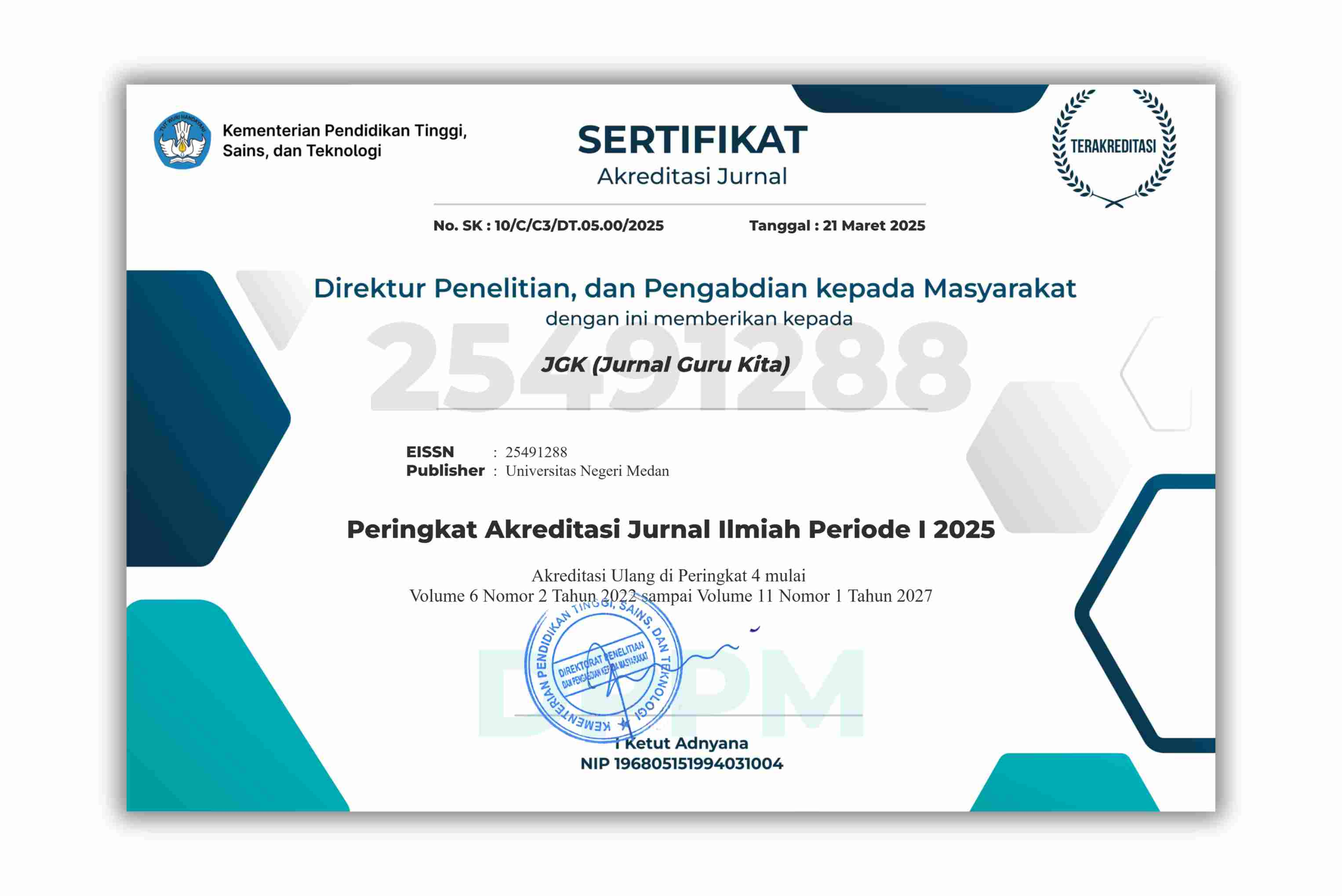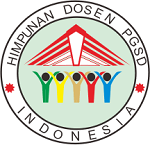CHILDREN'S FOLKLOR LITERATURE IN ELEMENTARY SCHOOL CHILDREN
DOI:
https://doi.org/10.24114/jgk.v7i4.50795Keywords:
Literary Literacy, Folklore, Elementary School ChildrenAbstract
Children's literature studies need to be developed in schools. This is reasonable because literature has an important role in building children's character. Literary literacy has the scope of empowering elementary school children to love literature, one of which is folklore. Folklore is a vehicle for achieving goals in understanding various aspects of life, acting as a step in preserving existing local culture. This is felt to be necessary at this time because many of the younger generation have forgotten the culture which is the heritage of their ancestors and the pride of their identity. Children prefer to watch television or play games on cell phones. Teachers' knowledge of literature is very low, literature is taught by unprofessional teachers, teachers do not understand how to teach literature well, teachers have not taught with appropriate strategies in literary literacy. Elementary school is the main means for developing literary literacy. Elementary school is an important means of balancing the development of character education while continuing to teach everything related to good values. One of the processes that includes learning is literary literacy. Teacher creativity in literary literacy learning needs to be increased because with creative literature teachers it is hoped that the literary learning that occurs will really be liked by children. Likewise, the local government's political attention must be to appreciate and accommodate literary literacy in schools, study groups, libraries and reading houses.References
Abidin, Yunus. 2015. Pembelajaran Multiliterasi. Bandung: Refika Aditama.
Airha. 2012. Studi kepustakaan. (Online).(http://phairha.blogspot.co.id/2012/01/studi-kepustakaan.html. Diakses pada tanggal 14 September 2019).
Alwasilah, A. Chaedar. 2012. Pokoknya Rekayasa Literasi. Bandung: PT. Kiblat Buku.
Arikunto, Suharsimi. 2012. Prosedur Penelitian Suatu Pendekatan Praktik. Rineka Cipta: Bandung.
A.Teeuw. 1984. Ilmu Sastra Pengantar Teori Sastra. Rineka Cipta: Bandung.
Baynhan, M. 2006. Literacy Practices: Investigation Literacy in Social Context. United Kingdom: Longman Group Limited.1 995-2.
Cooper, David. 1997. Literacy Helping Children Construct Meaning. Boston, New York: Houghton Mifflin Company.
Klarer, Mario. 2000. An Introduction to literacy studies. London and Newyork: Routledge.
Krippendoff, Klaus. 1993. Analisis Isi: Pengantar Teori dan Metodologi. Jakarta: Citra Niaga Rajawali Press.
Malawi, Ibadullah, dkk. 2017. Pembelajaran Literasi Berbasis Sastra Lokal. Jawa Timur: CV. Ae Media Grafika.
Nurgiyantoro, Burhan. 2012. Sastra Anak: Pengantar Dunia Anak. Yogyakarta: UGM Press.
Permendikbud RI Nomor 23 Tahun 2015.
Rosidi, Ajip. 2016. Sastera dan Budaya. Jakarta: Pustaka Jaya.
Soedjatmoko. 2010. Menjadi Bangsa Terdidik. Jakarta: Kompas.
Suastika, I Made. 2006. Estetika dan Kreativitas Penulisan Sastra dan Nilai Budaya Bali. Denpasar: UNUD Press.
Soedjatmoko. 1995 Dimensi Manusia dalam Pembangunan: Pilihan Karangan. Jakarta: LP3 ES.
USAID. 2014. Pembelajaran Literasi Kelas Awal di LPTK. Jakarta: USAID.
Downloads
Published
How to Cite
Issue
Section
License
Copyright (c) 2023 Halimatussakdiah

This work is licensed under a Creative Commons Attribution-ShareAlike 4.0 International License.
Authors published with the JGK (Jurnal Guru Kita) agree to the following terms:
- Authors retain copyright and grant the journal the right of first publication with the work simultaneously licensed under a Creative Commons Attribution License (CC BY-SA 4.0) that allows others to share the work with an acknowledgment of the work's authorship and initial publication in this journal.
- Authors are able to enter into separate, additional contractual arrangements for the non-exclusive distribution of the journal's published version of the work (e.g., post it to an institutional repository or publish it in a book), with an acknowledgment of its initial publication in this journal.
- Authors are permitted and encouraged to post their work online (e.g., in institutional repositories or on their website) prior to and during the submission process, as it can lead to productive exchanges, as well as earlier and greater citation of published work. (See The Effect of Open Access)

























